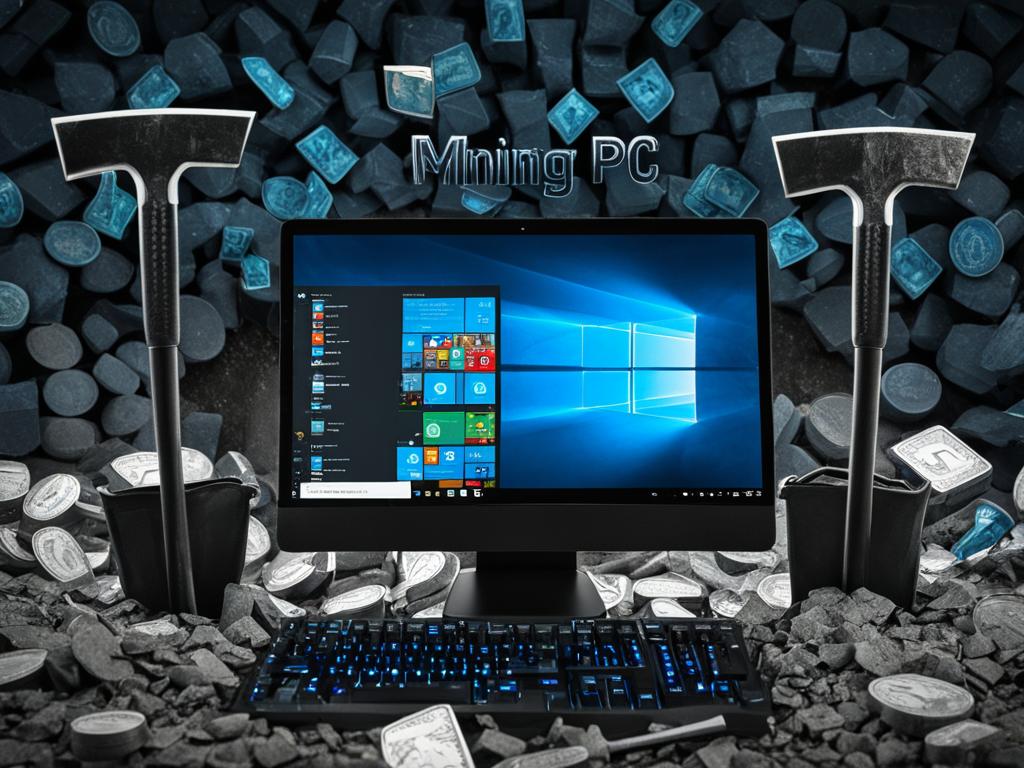Can You Mine Crypto on a Virtual PC? Insights & Tips
Venturing into the digital gold rush of cryptocurrency mining has traditionally demanded robust hardware investments. However, the evolution of technology has given rise to an alternative mining method—using virtual PCs. While it is technically feasible to mine on a virtual PC, miners must navigate through a series of caveats such as limited hardware access, the performance of mining software, and significant electricity consumption. The appeal of virtual PC mining also faces the challenge of compatibility with various mining software and the risk of resource-intensive processes potentially impacting other applications on the host system. Despite these hurdles, virtual PCs offer a unique route for accessing and experimenting with the crypto mining space, though they may not match the efficiency or profitability of dedicated mining rigs.
Key Takeaways
- Virtual PC mining is technically feasible but comes with a range of challenges and limitations.
- Limited hardware access and compatibility issues with mining software can hinder virtual PC mining performance.
- Resource-intensive processes of virtual PC mining may impact other applications on the host system.
- Compliance with local cryptocurrency regulations and virtual PC providers’ terms of service is crucial when mining on a virtual machine.
- Optimizing your virtual mining setup by allocating dedicated resources and choosing the right cryptocurrency can help, but dedicated mining hardware remains more efficient and profitable.
Understanding the Basics of Crypto Mining
Cryptocurrency mining is an indispensable digital process that serves as the backbone of blockchain networks, facilitating transaction verification and token generation through the deployment of powerful computers. Grasping the fundamentals of crypto mining illuminates the scope and limitations of mining on unconventional platforms, like virtual PCs.
Defining Cryptocurrency Mining
Crypto mining involves the completion of several crucial steps, such as transaction pooling, block formation, and solving complex mathematical puzzles for block verification, to ensure the smooth operation of blockchain networks. As opposed to traditional mining, which relies on physical tools, cryptocurrency mining hinges on substantial computational power provided by powerful computers.
Required Hardware for Traditional Mining
The demanding nature of crypto mining necessitates the use of specialized hardware such as Application-Specific Integrated Circuits (ASICs) and Graphics Processing Units (GPUs). These distinct components provide the significant computing power required to address the resource-intensive processes associated with digital currency mining.
Overview of Proof of Work (PoW)
Proof of Work (PoW) is a commonly adopted consensus mechanism in cryptocurrency mining. Through this method, miners verify transactions and secure networks, enabling cryptocurrencies to function as decentralized digital currencies. Proficiency in the PoW mechanism is crucial for understanding the potential advantages and drawbacks of mining crypto on a virtual pc.
Challenges and Limitations of Virtual PC Mining
For crypto enthusiasts curious about virtual pc crypto mining, understanding the challenges and limitations they may face is crucial in making an informed decision. Key hurdles stem from the inherent hardware limitations of virtual environments, compatibility issues with mining software, and the extensive resource consumption potentially impacting host systems. When comparing crypto mining with virtual pc to dedicated hardware mining, these factors highlight the less favorable aspects of mining on a virtual pc.

Hardware Access and Performance Bottlenecks
Access to GPUs and CPUs is often restricted in virtual machines due to the shared resources, creating performance bottlenecks that may reduce mining efficiency and result in lower rewards. In contrast, dedicated hardware mining allows miners to fully utilize their GPUs and CPUs, yielding more stable performances and higher returns.
Compatibility Issues with Mining Software
Not all mining software is compatible with virtual pc environments; this may lead to issues with software stability and potentially cause system crashes. Moreover, even if some software works in a virtual machine, it might not be as efficient as when running on hardware designed explicitly for crypto mining. In comparison, dedicated mining rigs and hardware offer increased compatibility with a broader range of mining software.
Resource Consumption and Impact on Host Systems
Virtual machine crypto mining demands considerable resources, which may burden the host computer’s operations and contribute to wear and tear on its components. As virtual PCs often share resources with other applications running on the host system, the resource-intensive mining process might negatively impact those applications’ performance. In contrast, dedicated hardware mining provides a more focused approach in terms of resource allocation, minimizing potential negative impacts on other applications or system components.
In conclusion, while virtual pc crypto mining may be an intriguing option for curious miners, its inherent limitations and challenges render it less favorable compared to dedicated hardware mining. Those interested in exploring crypto mining should carefully weigh the pros and cons before venturing into virtual machine mining for an informed and strategic approach.
Can You Mine Crypto on a Virtual PC: Technical Feasibility
When assessing the question, can you mine cryptocurrency on a virtual pc, the answer is yes, but with notable limitations. Cryptocurrency enthusiasts venturing into virtual PC crypto mining must be aware of the potential challenges that come with this unconventional approach. While some advanced techniques can help bypass certain obstacles, these methods often demand expert knowledge, restrict user performance, and are limited to specific hardware.
One such method that miners can employ is PCIe Passthrough, which enables direct access to the host hardware for the virtual machine (VM). This technique significantly enhances VM performance but simultaneously requires a compatible system. Similarly, nested virtualization is an approach that allows miners to run a virtual machine within another VM. However, this method again demands considerable technical prowess and compatible hardware.
While certain altcoins with lower resource demands may offer some leeway, the practicality of VM mining remains a contentious topic, particularly for those aiming to mine resource-intensive cryptocurrencies like Bitcoin.
Mining crypto with a virtual machine also requires a comprehensive understanding of the limitations. As a result, novice miners who lack extensive experience in virtualization may find it challenging to navigate these complexities, and mining profitability may suffer.
| Pros | Cons |
|---|---|
| Accessibility: Allows users to mine crypto without investing in physical mining rigs | Performance: Constraints on hardware performance and software optimization can hinder mining efficiency |
| Experimentation: Offers a platform for miners to test different mining software and settings | Expertise: Advanced techniques such as PCIe Passthrough and nested virtualization necessitate technical proficiency and compatible hardware |
| Variety: Feasible for mining certain altcoins with lower resource demands | Practicality: Remain less suitable for resource-intensive cryptocurrencies like Bitcoin |
In conclusion, while virtual PC crypto mining is technically feasible, numerous challenges and limitations may deter miners from pursuing this method. For those aiming for optimum efficiency and profitability, dedicated hardware mining remains the more viable and effective option.
Legal Considerations when Mining on a Virtual Machine
Mining crypto on a virtual PC has grown in popularity, but it’s essential to understand the legal aspects surrounding this practice. There are two primary aspects to consider: the terms of service for virtual machine providers and local cryptocurrency regulations.
Reviewing Virtual Machine Providers’ Terms
Before diving into virtual pc crypto mining, be diligent in reviewing the terms of service for your chosen cloud or virtual machine software providers. These terms may contain prohibitions against mining in an effort to prevent resource exploitation and potential damage to hardware. Violating these guidelines can lead to suspension or termination of your virtual machine, so it’s essential to ensure compliance from the outset.
Navigating Local Cryptocurrency Regulations
In addition to adhering to virtual machine provider terms, you should also familiarize yourself with local cryptocurrency regulations. Laws governing virtual pc crypto mining vary widely depending on jurisdiction, with different rules and restrictions potentially in play. While the act of mining on a virtual PC is commonly legal, it is subject to nuances that demand attention and adherence to ensure the sustainability of mining activities within legal frameworks.
Note: This article does not constitute legal advice and is for informational purposes only. Consult a legal professional for guidance on cryptocurrency mining laws in your area.

Optimizing Your Virtual Mining Setup
When mining cryptocurrencies on a virtual PC, it is crucial to optimize your setup to make the most of the limited resources available. Through allocating dedicated resources to your virtual machines and selecting the right cryptocurrencies for this method, you can enhance the performance of your virtual mining system. However, the profitability and efficiency of virtual PC mining are still far behind dedicated mining hardware, making it a supplementary alternative for enthusiasts.
Allocating Dedicated Resources to Virtual Machines
To improve the performance of your virtual PC for mining, consider allocating dedicated resources to your virtual machines. By reserving specific CPU, GPU, and RAM resources exclusively for your mining operations and customizing the software settings, you can fine-tune the capabilities of your virtual platform. This can help to mitigate potential performance bottlenecks, leading to a more effective virtual machine mining strategy.
Choosing the Right Cryptocurrency for Virtual Mining
Selecting a cryptocurrency that aligns with the constraints of virtual machines is essential for optimizing your setup. Mining less resource-intensive cryptocurrencies, such as Monero (XMR), Ravencoin (RVN), or Electroneum (ETN), can provide more viable opportunities for virtual PC mining. By focusing on these types of cryptoassets, you may be able to make the most of your virtual mining systems, but keep in mind that they won’t always match the profitability and efficiency of dedicated mining hardware.
FAQ
Can you mine crypto on a virtual PC?
Yes, you can technically mine crypto on a virtual PC, but you will face limitations such as restricted hardware access, reduced mining efficiency, lower rewards, and potential compatibility issues with mining software.
What are the challenges of virtual PC crypto mining?
Some challenges include limited hardware performance, compatibility issues with mining software, and significant resource consumption which can impact the host system’s operation and other applications.
Can you mine Bitcoin on a virtual machine?
Although it is possible to mine Bitcoin on a virtual machine, the hardware limitations and performance bottlenecks make it highly impractical and inefficient compared to dedicated mining hardware.
Are there any legal considerations for crypto mining on a virtual PC?
Yes, miners should review the terms of service for virtual machine software providers and ensure adherence to local cryptocurrency regulations. Violating terms of service or local laws may lead to penalties or account deactivation.
How can you optimize a virtual mining setup?
Some ways to optimize your virtual mining setup include allocating dedicated resources to virtual machines and customizing software settings, along with choosing less resource-intensive cryptocurrencies like Monero (XMR), Ravencoin (RVN), or Electroneum (ETN).
Can virtual PC mining compete with dedicated mining rigs in terms of efficiency and profitability?
No, due to the inherent limitations and challenges of virtual PC mining, the efficiency and profitability of virtual PC mining are generally overshadowed by those of dedicated mining hardware.

